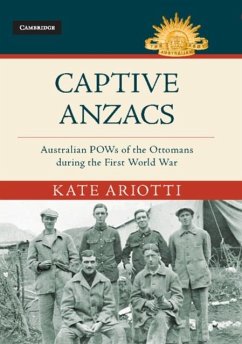During the First World War, 198 Australians became prisoners of the Ottomans. Overshadowed by the grief and hardship that characterised the post-war period, and by the enduring myth of the fighting Anzac, these POWs have long been neglected in the national memory of the war. Captive Anzacs explores how the prisoners felt about their capture and how they dealt with the physical and psychological strain of imprisonment, as well as the legacy of their time as POWs. More broadly, it explores public perceptions of the prisoners, the effects of their captivity on their families, and how military, government and charitable organisations responded to the POWs both during and after the War. Intertwining rich detail from letters, diaries and other personal papers with official records, Kate Ariotti offers a comprehensive, nuanced account of this aspect of Australian war history.
Dieser Download kann aus rechtlichen Gründen nur mit Rechnungsadresse in A, B, BG, CY, CZ, D, DK, EW, E, FIN, F, GR, HR, H, IRL, I, LT, L, LR, M, NL, PL, P, R, S, SLO, SK ausgeliefert werden.

